Key takeaways:
- Hospital ministry connects spiritual support with medical care, emphasizing the emotional needs of patients and families.
- Community volunteering enhances emotional support and fosters connections, benefiting both volunteers and those they serve.
- Identifying community needs requires active listening and collaboration with local organizations for effective engagement.
- Encouraging volunteer participation hinges on highlighting the impact of contributions and creating inclusive opportunities.
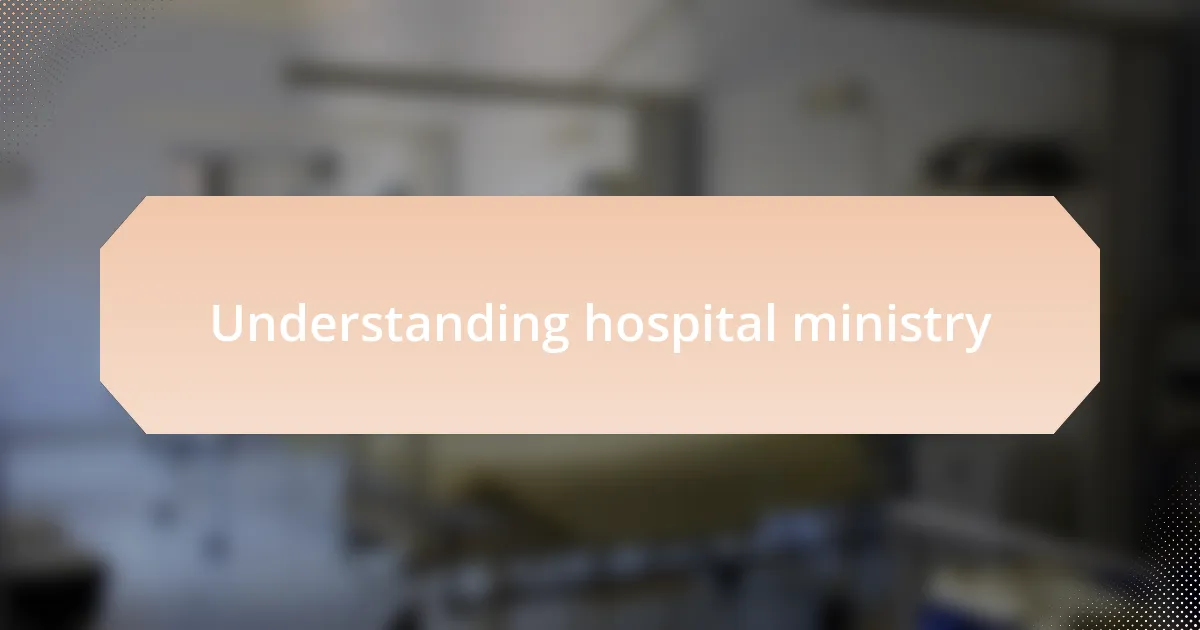
Understanding hospital ministry
Hospital ministry is a unique facet of caregiving that connects spiritual support with medical care. It thrives on the understanding that patients and families navigate complex emotional and spiritual landscapes during health crises. I’ve often found myself reflecting on how deeply people yearn for hope and connection, especially when faced with the uncertainties of illness.
As I’ve engaged with patients in hospital settings, I’ve witnessed how a simple conversation can provide immense comfort. There was one patient, a man battling cancer, who just needed someone to listen. His expressions of fear and vulnerability resonated with me, highlighting the importance of being present in someone’s moment of despair. It makes me wonder: how often do we recognize our influence in uplifting another’s spirit?
The essence of hospital ministry is about creating an atmosphere where healing can encompass both body and soul. It transcends religious boundaries, reaching people from all walks of life. I remember a time when a prayer gathering in the hospital fostered a sense of community among diverse individuals, reminding us that during times of hardship, we lean on each other for support. Doesn’t this beautifully illustrate the power of shared humanity?
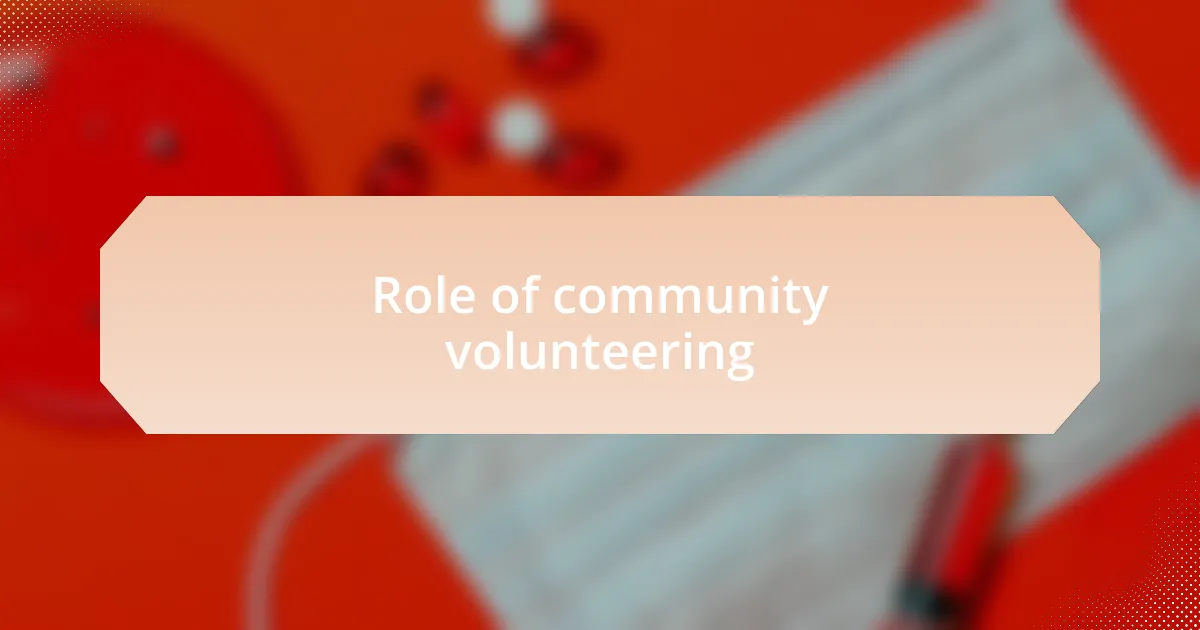
Role of community volunteering
Volunteering within the community plays an essential role in bridging the gap between healthcare and emotional support. I remember volunteering at a local food bank, where the genuine smiles and heartfelt conversations reminded me of the human connection we all crave, especially in challenging times. It struck me that every moment spent engaging with others not only alleviated their burdens but also enriched my own spirit.
In hospital ministry, community volunteers often serve as a lifeline for patients and families, providing them with both physical assistance and emotional presence. One evening, while assisting in a hospital’s waiting area, I met a family whose loved one was undergoing surgery. Just sharing a cup of coffee and discussing their worries shifted the atmosphere, showcasing how volunteers can bring comfort through simple acts of kindness. Isn’t it remarkable how a small gesture can create a ripple effect of hope?
Furthermore, community volunteering fosters a sense of belonging and purpose among volunteers themselves. I’ve found that the more I invest my time in helping others, the more connected I feel to my own community. Have you ever noticed how volunteering often transforms your perspective on life? Through these experiences, I’ve come to believe that engaging with others in volunteer work creates a circle of wellness that ultimately benefits us all.
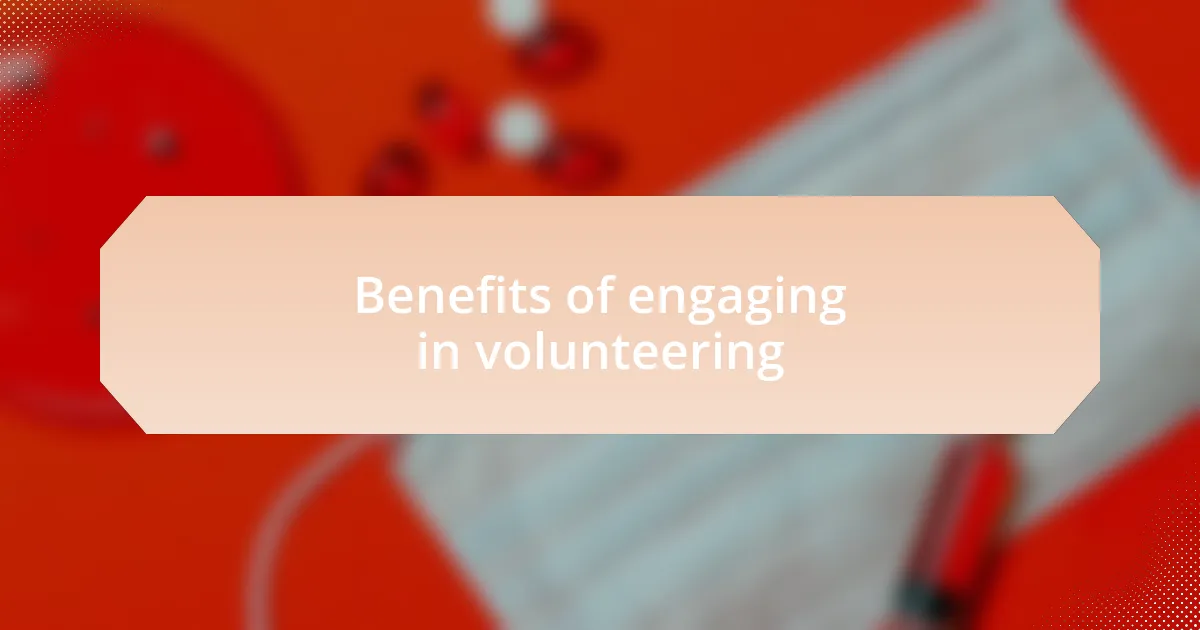
Benefits of engaging in volunteering
Engaging in volunteering offers transformative benefits that extend far beyond the immediate impact on those being helped. I recall a time when I participated in a community clean-up event. As we picked up litter together, I felt an overwhelming sense of camaraderie with strangers, each of us united by a common goal. This shared experience not only beautified our surroundings but also strengthened our bonds, showcasing how collective efforts can foster community spirit.
Volunteering also encourages personal growth and self-discovery. I remember mentoring a young girl through a literacy program, and, in guiding her, I found myself reflecting on my own educational journey. The patience I exercised and the insights I gained about teaching ignited a new passion for sharing knowledge. Have you ever experienced a moment where teaching someone else also taught you something valuable about yourself? This kind of exchange is what makes volunteering so profoundly rewarding.
Moreover, engaging in volunteer work can have significant mental health benefits. I often found myself using volunteering as a respite from my own stress and anxieties. One afternoon spent organizing a fundraiser left me feeling revitalized; the excitement and determination of the team were infectious. Have you ever noticed how focusing on others can lighten your own burdens? By immersing ourselves in service, we cultivate a sense of purpose that uplifts our spirits and contributes to our overall well-being.
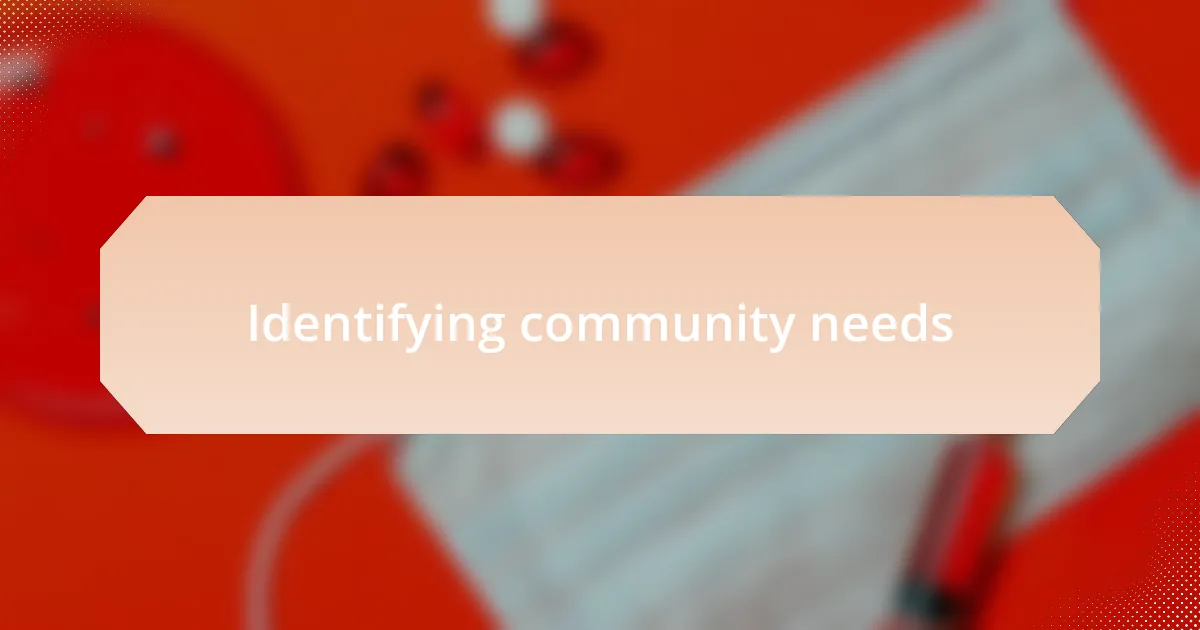
Identifying community needs
Identifying the needs within a community often begins with listening to its members. I remember attending a town hall meeting where residents openly shared their struggles, whether it was access to healthcare or assistance for the elderly. I was struck by the power of their voices; it illuminated issues I hadn’t even considered before. Have you ever realized that sometimes the answers you seek are just waiting for you to ask the right questions?
Another effective method is conducting surveys to gather input. During one initiative, I helped design a simple questionnaire distributed at local events. The responses were eye-opening; many people expressed a desire for mental health resources and youth activities. This experience reinforced my belief that community involvement should be driven by the genuine needs of those we aim to serve. How often do we assume we know what others need without truly understanding their perspectives?
Lastly, partnering with local organizations can reveal hidden challenges. I collaborated with a nonprofit that focused on homelessness, and their insights were invaluable. They highlighted urgent needs that went unnoticed by wider community dialogue. This collaboration showed me the importance of leveraging existing resources and expertise to identify and address those pressing community issues effectively. Have you ever thought about how teamwork can lead to greater awareness and a more comprehensive understanding of community needs?
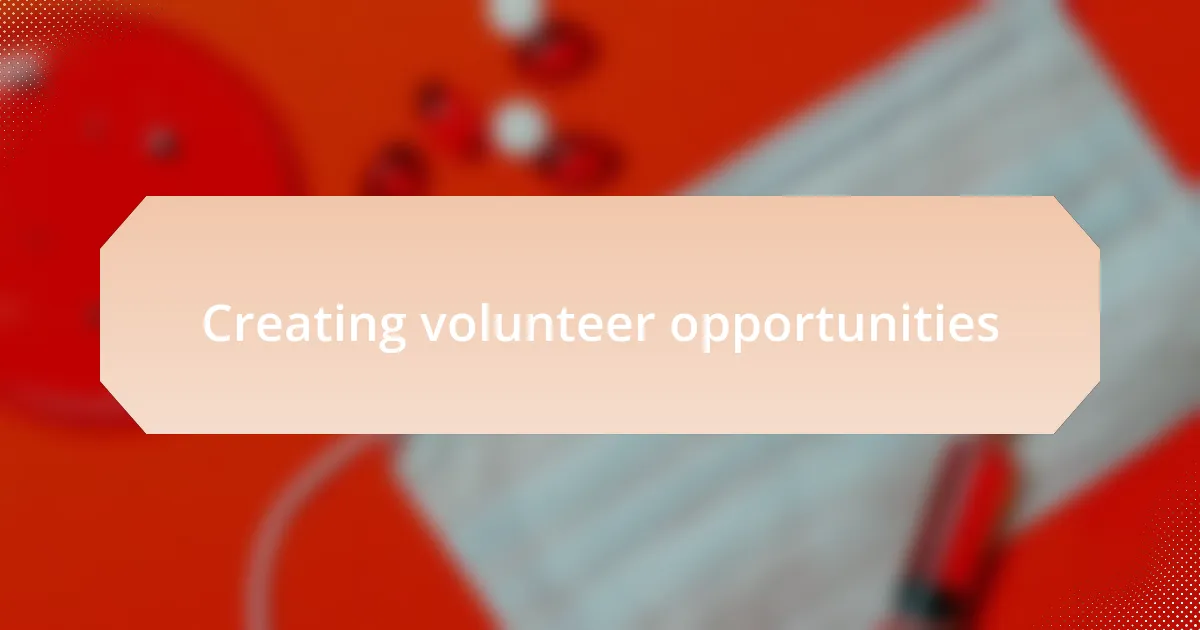
Creating volunteer opportunities
Creating volunteer opportunities hinges on understanding the motivations of potential volunteers. In my experience, I took the time to consult with local residents about what types of activities resonated with them. Based on their feedback, I discovered a surprising enthusiasm for mentoring youth, something I wouldn’t have predicted. Isn’t it fascinating how simply asking can reveal hidden interests?
I’ve also found that organizing skill-based volunteering can be highly effective. For instance, I once coordinated a workshop where local artists taught painting to seniors. The joy on their faces as they created something beautiful was infectious. Have you considered how sharing skills not only empowers individuals but also fosters community bonds?
Moreover, making volunteering accessible is crucial. I learned this firsthand when I arranged activities at various times, accommodating different schedules. Providing options allowed more people to participate, even those who previously felt left out. How often do we overlook the importance of accessibility in volunteer work? By prioritizing inclusivity, we truly enrich the community experience.
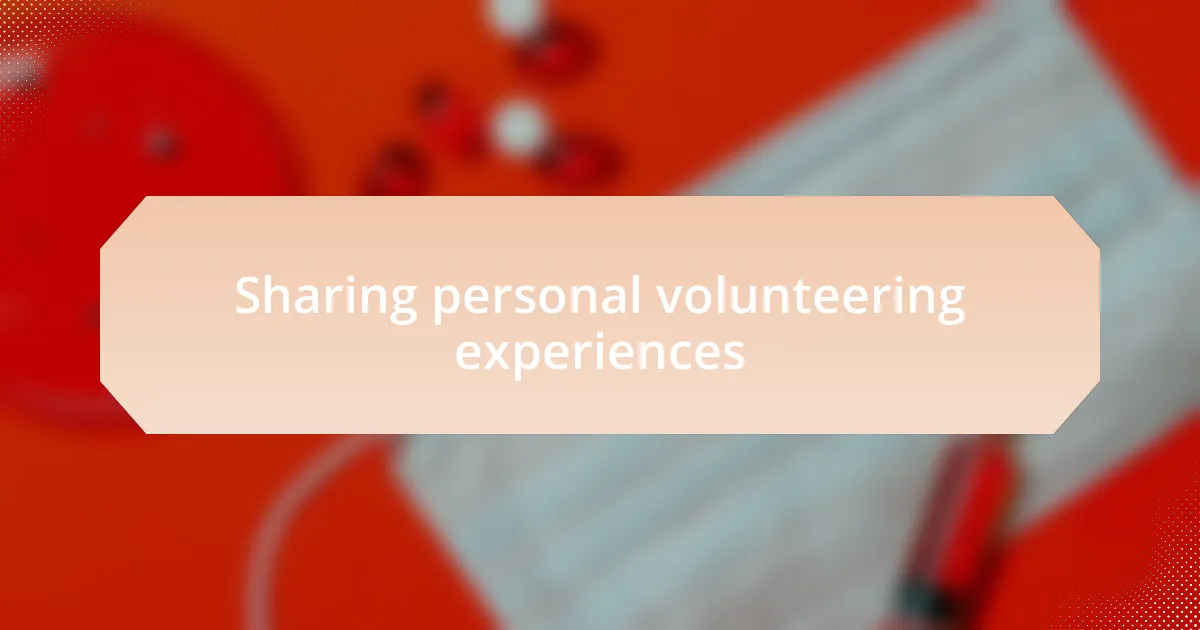
Sharing personal volunteering experiences
When I first started volunteering at the local shelter, I was nervous but excited about the impact we could make. I remember a moment when I was serving food, and a young boy approached me, his eyes wide with curiosity. “Are we really helping?” he asked, and in that instant, I reflected on how our small efforts could create significant changes in someone’s life. Have you ever had a moment where a simple action made you realize the power of kindness?
In another instance, I participated in a community cleanup day, armed with gloves and garbage bags. As we collected litter, I found myself in conversation with a retired teacher who shared stories of past volunteering experiences. She described how those moments had given her a sense of purpose long after her career ended. Listening to her made me appreciate the long-lasting effects that volunteering has—not just on the community, but on our personal journeys as well. Isn’t it amazing how these shared stories bridge generations?
One of my most cherished memories is when I helped organize a charity run. The atmosphere was filled with energy and excitement, and participants shared their reasons for joining—everything from honoring loved ones to making a difference. I could see their determination, and it struck me how such collective efforts not only bring people together but also create a ripple effect of goodwill. Do you notice how each story of volunteering carries its own weight, inspiring others to join the mission?
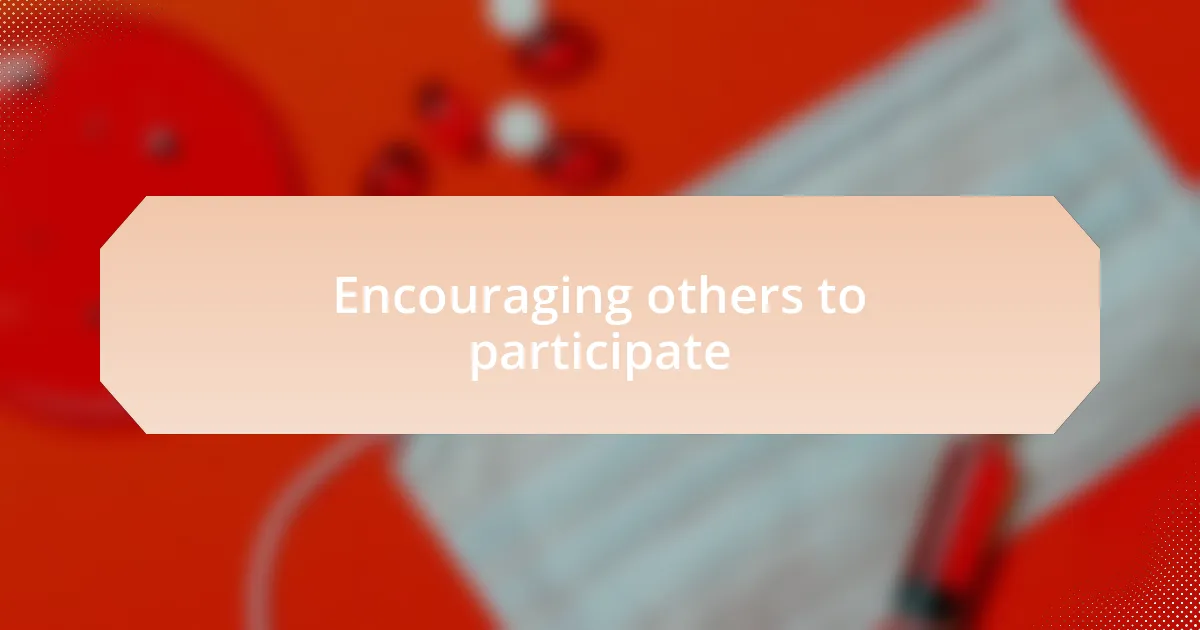
Encouraging others to participate
Encouraging others to participate is often about sharing the impact volunteering can have on our lives. I remember inviting a friend to join me for a community soup kitchen event. Initially hesitant, she told me she felt overwhelmed by the challenges in our world. However, after serving meals together, she couldn’t stop smiling, realizing that even small contributions could uplift others. Have you seen how a shift in perspective can ignite motivation in someone?
I’ve found that creating a welcoming environment counts for a lot. During a church fundraiser, I made it a point to celebrate each volunteer’s contribution, no matter how small. One individual hesitated before signing up but left the event bubbling with enthusiasm, sharing her plans to recruit her neighbors for future activities. Isn’t it incredible how recognition can empower someone to take the leap into community engagement?
Sometimes, a simple gesture can be the spark that inspires others. At a recent community fair, I set up a booth to discuss local volunteering opportunities. After a conversation with a curious teenager about his interests in environmental issues, I saw his eyes widen with excitement. Encouraging him to join a local tree-planting initiative, I realized that sometimes, all it takes is one conversation for someone to take their first step into a new world of giving back. Have you experienced a moment like that, where inspiration passed from one person to another?